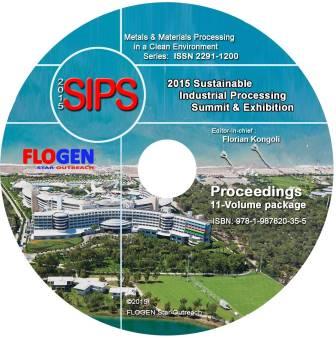2015-Sustainable Industrial Processing Summit
SIPS 2015 Volume 11: Recycling & Environmental
| Editors: | Kongoli F, Havlik T, Pagnanelli F |
| Publisher: | Flogen Star OUTREACH |
| Publication Year: | 2015 |
| Pages: | 410 pages |
| ISBN: | 978-1-987820-34-8 |
| ISSN: | 2291-1227 (Metals and Materials Processing in a Clean Environment Series) |

< CD shopping page
Adapting to Climate Change Impacts: The Moral and Practical Challenge to Help the Most Vulnerable Communities in Developing Countries and Working towards Sustainable Communities
Mangalapudi Ramesh Babu1;1EFICOR, New Delhi, India;
Type of Paper: Regular
Id Paper: 274
Topic: 10
Abstract:
Climate Change is a serious threat to all nations across the globe. The climate change effects on developing countries like India and China are adverse as their capacity and resources to deal with the challenge is limited. India has been experiencing disasters such as Floods, Cyclones and Droughts resulting in loss of lives and livelihoods in an increasing manner. Farmers, Women, adolescent girls and children are the worst sufferers. The disasters and its aftermath effect distort their living. Victims take shelter on embankments, railway tracks often under the open sky in the case of floods. Scarcity of food and drinking water compels people to consume minimal. In drought situation, migration is rampant as communities do not find employment in their areas and are forced to migrate to cities or other places where farm based livelihood is available. Climate related mortality is increasing. Poor governance and improper service provision by the government compounds the vulnerability of disaster affected communities in India. EFICOR, with a strong emphasis on community mobilization and people centric advocacy, involves with the most vulnerable community with an approach of community based adapation to climate change. Disaster Risk Reduction (DRR) as adaptation tool is being implemented in flood prone and arid zone (drought) areas of North India.
These programs in sync with the participatory planning process has set up mitigation structures like evacuation routes, tube wells on high-raised platforms to save them being contaminated during the floods and water harvesting structures like check dams, farm ponds, gully plugs, and afforostation as carbon credits. These projects's experiences suggest that a well planned "DRR and adaptation" initiates with community capacity building backed up by common minimum governance measures establishing a resilient community with minimum loss of life and livelihood thus adapting to changing climate. Sustainable development has been a vibrant focus since the beginning of the program. Communities have been informed and empowered to be able to work as pressure groups to get entitlements. There have been sustainable links with the potential corporates, industries and line department to further see sustainable development with long term focus where young generation can able to equipped and work towards sustainable development.